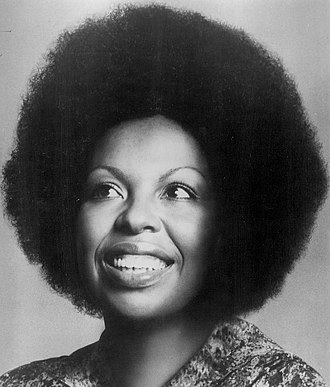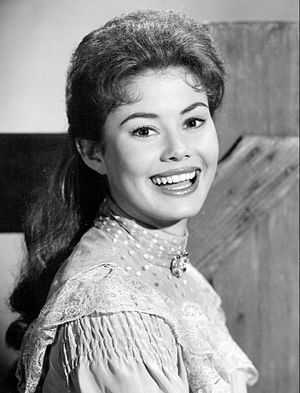Discover Your Roots
SIGN UPDiscover Your Roots
SIGN UPRoberta is a charming female name of English origin, meaning "Bright Fame." It is the feminine form of the given names Robert and Roberto. Derived from Germanic roots, the name reflects the attributes of brightness, fame, and glory. The stem *hrod signifies "famous," "glorious," and "godlike," while *berht represents "bright," "shining," and "light." The name Roberta has been borne by notable individuals across various fields, including politics, arts, sports, and academia. It also features in fiction, with characters such as Rosarita "Roberta" Cisneros from the anime and manga series Black Lagoon. With its rich history and significance, Roberta continues to remain a timeless and elegant choice for parents seeking a name with a meaningful and positive connotation for their daughter.

Roberta Cleopatra Flack (February 10, 1937 – February 24, 2025) was a renowned American singer and pianist celebrated for her emotionally charged, genre-blending ballads that traversed R&B, jazz, folk, and pop music. She was instrumental in shaping the quiet storm radio format and achieved commercial success with chart-topping singles such as "The First Time Ever I Saw Your Face," "Killing Me Softly with His Song," and "Feel Like Makin' Love." Notably, Flack became the first artist to win consecutive Grammy Awards for Record of the Year. Her collaboration with Donny Hathaway produced hit duets like "Where Is the Love" and "The Closer I Get to You." Throughout her illustrious career, Flack continued to make an impact with successful duets such as "Tonight, I Celebrate My Love" and "Set the Night to Music." In 2020, she received the prestigious Grammy Lifetime Achievement Award in recognition of her significant contributions to the music industry. Born in Black Mountain, North Carolina, Flack's early musical experiences were rooted in church, and she later excelled in classical piano, winning a full music scholarship to Howard University. Her journey to becoming a revered artist was marked by her dedication to music and her exceptional talent, leaving an indelible mark on the world of music.

Roberta Jymme Schourup, known professionally as Roberta Shore, is a retired American actress renowned for her roles in the original Shaggy Dog film and as Betsy Garth on the Western television series The Virginian. Born on April 7, 1943, she gained early recognition through several Walt Disney productions, and her association with the Mouseketeers. Shore's television credits include appearances on various popular shows, and she was notably featured in the first four seasons of The Virginian. Despite her promising career, Shore broke her contract at the age of 22 to focus on her marriage and family, a decision influenced by her strong Mormon faith. Following her marriage, she settled in Utah, where she has resided ever since. In 1974, she starred in a short film called Cipher in the Snow, marking her final film credit. Today, Roberta Shore continues to be remembered for her contributions to the entertainment industry.

Roberta Elizabeth Marshall Cowell (8 April 1918 – 11 October 2011) was a British racing driver and Second World War fighter pilot. Born in Croydon, London, she attended Whitgift School and later joined General Aircraft Limited as an apprentice aircraft engineer. Despite being discharged from the Royal Air Force due to airsickness, she continued her passion for engineering and motor-racing. During the Second World War, Cowell served in the Royal Army Service Corps before transferring to the RAF. She flew with a front-line Spitfire squadron and was captured by German troops after her aircraft was shot down. Cowell remained a prisoner for around five months, where she taught automotive engineering to fellow inmates. After the war, she underwent gender-affirming surgery in 1951, becoming the first known British trans woman to do so. Her experiences during the war and her journey as a transgender woman are documented in her biography. Roberta Cowell's courageous and groundbreaking life continues to inspire and influence others, leaving a lasting legacy in both the fields of aviation and gender identity.

Roberta Farnham Maxwell, born on June 17, 1941, is a highly respected Canadian actress with an extensive career in theater, film, and television. Her passion for the stage began in her early teens, leading her to join John Clark as the child co-host of his Junior Magazine series for CBC Television. Maxwell's talent shone brightly at the Stratford Shakespeare Festival, where she portrayed memorable characters such as Ursula in Much Ado About Nothing, Lady Anne in Richard III, and Olivia in Twelfth Night. Her career extended to England, where she spent three years in repertory, eventually making her West End debut and Broadway debut in The Prime of Miss Jean Brodie in 1968. Maxwell's remarkable performances in Equus, Mourning Becomes Electra, and As You Like It further solidified her reputation as a versatile and skilled actress. Noteworthy film credits include appearances in Rich Kids, Popeye, The Changeling, Psycho III, Philadelphia, Dead Man Walking, and Brokeback Mountain. Her compelling portrayal in Last Night earned her a Genie Award nomination for Best Supporting Actress. Maxwell's outstanding contributions have been recognized with prestigious awards such as the Obie Award, Drama Desk Award, and Online Film & Television Association Award. Her remarkable talent continues to captivate audiences, making her a revered figure in the entertainment industry.

Roberta Collins (November 17, 1944 – August 16, 2008) was a captivating film and television actress best known for her striking appearance, which often drew comparisons to Marilyn Monroe. She gained fame through her roles in exploitation films, such as Tobe Hooper's "Eaten Alive" and "Death Race 2000," where she portrayed memorable characters like the prostitute Clara and Matilda the Hun, respectively. Despite her potential, director Jack Hill expressed that Collins struggled to maintain a stable personal life, impacting her career prospects.Collins' journey into the entertainment industry began when she was signed to a studio contract after high school, although her option was not ultimately pursued. Despite this setback, she remained determined to hone her craft, eventually landing roles in both exploitation and non-exploitation films, including her portrayal of Jean Harlow in the 1975 pop musical "Train Ride to Hollywood."Tragically, Collins passed away on August 16, 2008, due to an accidental overdose of drugs and alcohol. Her legacy lives on through tributes and a musical album inspired by her work. In her own words, she expressed a desire to break free from her B-movie-queen reputation and take on more profound, multi-dimensional roles in mainstream cinema.Roberta Collins' impact on the film industry and her aspiration to make a meaningful statement through her acting continue to resonate with audiences and industry professionals alike.
All images displayed on this page are sourced from Wikipedia or Wikimedia Commons.We use these images under their respective Creative Commons or public domain licenses. Wherever applicable, author attributions and license information are provided. If you believe an image is used incorrectly or outside its license terms, please contact us so that we can review and correct the issue.